


 By E
By E





 By E
By E

try has only released 33percent of the approved funds to the commission.
According to a report by Parliament’s Finance Committee on the 2023 Annual Budget Estimates of NDPC, an amount of GHc16m was approved for the commission for its activities in 2022 budget, however as at September 2022, only GHc5.4m, representing 33percent of the revised budget was released to the commission.

The amount released was only for compensation as well as Goods and Services with no money for capital

capacity to accommodate the large volumes of reports generated by the commission.
“The committee urges the Ministry of Finance to release the allocation for capital expenditure to the Commission to enable it meet its planned IT infrastructure upgrade,” the report captured.
The report also indicated that the NDPC will undertake the following activities in the 2023 nancial year, provide technical backing for the formulation of sector policies and review draft policies, the commission would develop a blue econo-
national care policy and develop tools for mainstreaming policies like the food systems transformation, nutrition security, gender and climate change.
The commission would scale-up and deploy a legislative and policy almanac application, review and nalise the long-term perspective plans and monitor the e ective implementation of local economic development.
The commission would establish National Monitoring and Evaluation Information System.
 By Eugene Davis
By Eugene Davis
The Minister of Communications and Digitalisation, Ursula Owusu-Ekuful has emphasized that developing and growing local
talent to manage critical digital infrastructure in both the public and private sector is a surest way to consolidate human resource in the
country.
According to Ms. Owusu-Ekuful, technology is reshaping processes and sectors, and that the growing importance of digital literacy in a society cannot be underestimated especially the training of females.
Speaking at the 2022 Seeds for the Future programme in Accra on Wednesday, she stated that digital adoption and use can also o er women, and girls, in particular, opportunities to overcome hurdles they may face in the physical world.

She also noted that digital access can empower women and girls, help expand their sense of self in the world, increase civic engagement, and raise awareness of their rights. It will also facilitate exible working hours, enabling women combine their caregiving roles and careers e ectively, working from home with digital platforms.
“As we continue to rely more and more on ICT in all aspects of our lives and government continues to invest heavily on ICT infrastructure, it is essential that we prioritize cybersecurity and take steps to prevent and manage security threats as a way of protecting our investments. By investing in the development of experts and talents, we can help ensure that our systems and networks are secure and resilient, protecting individuals, businesses, and the society.
Careers are gender-neutral, don’t shy away from choosing STEM as your lifetime career, neither should you be afraid to demonstrate your leadership skills. The collaboration in ICT industry requires new power, as well as the power of females.”
The Managing Director of Huawei Ghana, Tommy Liang stated that it was his hope the girls gained valuable insights and experiences, and look forward to seeing them excel in their future careers.
“As you embark on the next chapter of your professional journeys, I want to encourage you to continue to learn, innovate, and strive for excellence. The world is changing at an incredible pace, and it is up to each and every one of us to keep pace with these changes and embrace the opportunities they bring.
I am con dent that the knowledge and skills you have acquired through the Seeds for the Future program will empower you to become leaders in your respective elds, and make signi cant contributions to Ghana’s ICT sector.
While in the program, these students received training in cutting-edge ICT technologies such as 5G, AI, Big Data, Cell Site Design, AR and VR. They also had the chance to be mentored by professionals during the Tech4Good program, and they created solutions to developmental challenges. As an all-girls edition, the program sought to empower and inspire young women to pursue careers in the male-dominated eld of ICT.
This year’s event had 50 students shortlisted for the training but 30 students were outstanding in the eight-day training and eventually graduated.

The event also saw prizes and awards presented to outstanding students, with Gloria Ankomah emerging tops and receiving GHc4,000, Edith Asibu Aba received GHc3,000 for placing second and Gloria Aku o taking home GHc2,000 for coming third.
There were honourary awards presented to the Minister of Communications and Digitalisation, Ursula Owusu-Ekuful, her deputy Ama Pomaa Boateng and Mr.Stallone Nyarko for their various support to the project.
The Seeds for the Future program have over the years developed a strong talent foundation for Ghana, particularly among young women.
The Seeds for the Future program which was focused on developing the ICT skills and leadership capabilities of young ICT Talents across 14 tertiary intuitions in Ghana.
The Innovative Finance and Capital Markets Section, Private Sector Development and Finance Division, United Nations Economic Commission for Africa (ECA) in collaboration with African Peer Review Mechanism (APRM), hosted a meeting on credit ratings from 5 to 7, December 2022.
The 3-day meeting consists of three segments: the 1st Meeting of Network of National Regulators on Credit Ratings; the 2nd Meeting of Member States Credit Ratings Liaison O cers; and the 7th Ad-hoc Committee Meeting on Credit Ratings.
Amongst the issues discussed were the low credit ratings and persistent downgrades of African Governments debt, which is detrimental to the continent’s investment competitiveness and recovery e orts from the COVID-19 pandemic shock.
In his opening remarks, Dr. McBride Nkhalamba, the Director of Specialized Governance and Reporting, APRM highlighted the credit ratings are an important
part of the global nancial architecture reform.
“It is important for African countries to address the regulatory gaps and promote local sovereign credit rating agencies”, Dr McBride echoed.
Ms. Sonia Essobmadje, Chief, Innovative Finance and Capital Markets Section, Private Sector Development and Finance Division, ECA, also addressed the importance of credit ratings and for the timing of this meeting in her welcome remarks.
“This meeting comes at a time when the continent is facing enormous debt management challenges and di culties in improving or maintaining good credit ratings”, said Ms. Sonia Essobmadje.
“The meeting should aim to explore ways to improve and harmonize the regulation of credit rating agencies on the continent”, she added. She stressed the importance of building capacity and improving the reliability and avail-
ability of data.
The meeting provides a platform for technical experts to exchange information and learn from each other on ways to minimize the challenges of negative rating actions.
It is envisaged that, if countries share experiences and exchange technical information on preparing for the upcoming rating reviews and an approach to address speci c risk factors assessed by rating agencies, they will avert a downgrade and, at best, can improve their ratings.
Experts further discussed the fundamental functions of credit ratings, their failures during multiple nancial crises showed that regulatory and supervisory oversight on rating agencies was crucial to enhance integrity, accountability, good governance, and independence of credit rating activities. Representatives of member States also shared their experiences in engaging credit rating agencies strengthening regulatory frameworks and adapting to a changing environment with new and emerging challenges.
The meeting recommended Governments to strengthen their Credit Ratings Country Liaison Teams to be able to respond to emerging needs and better engage with rating agencies.
Experts further recommended the National Regulators to champion the enactment of legislation on Credit Rating Services to ensure that regulation of international credit rating agencies is ‘at least at par with international requirements’ of regulated and accountable credit rating agencies.
The meeting also successfully adopted the Terms of Reference for Network of National Regulators of Credit Rating Agencies.
The meeting was attended by representatives from 14 African countries, rating agencies, regulators and partners, as well as individual experts.
ing at the launch, which was in partnership with Little Kenya, noted that the introduction of ride-hailing services in Ghana is a step toward unifying the African continent through the free trade agreement, fostering a robust transportation sector, and eradicating poverty on the continent.
Accra-Ghana-- Little, a Pan-African ride hailing service, has launched its services in Ghana to o er a go-to commuting option for corporate organizations employees and individuals at their convenience and at an a ordable rate. Little is touted as a highly professional and user-friendly service that provides safe, on-demand rides with various car categories to suit every rider’s unique preference.
Features of Little
Founder and Chief Executive O cer for Little, Kamal Budhabhatti, elaborating on the features of the service noted that both corporate and individual riders can have access to an array of car categories to choose from – Basic, Comfort, Comfort+, and Superwoman. He said Little is designed with rider and driver safety in mind; and is equipped with security features, such as GPS Map Tracking, SOS Emergency Services, Trip Sharing, Service Rating and 24-hours of customer support services. “Corporate organizations and individuals can also access additional features ranging from Budgeting, Preferred drives, Time and Distance Management, Airport transfers, SOS services and soon
Director for Little Ghana, Paul Jacquaye said the start of operations of Little in the country is to improve transportation services by providing cutting-edge digital services to Ghanaians and most importantly to the corporate organizations. He added that Little as it has started operations in Ghana will continue to spread it wings across other African countries to build a formidable African continent.
“For corporates, Little is a comprehensive transportation management system that makes it easy to manage logistics costs at every level of the company that provides automated and credible 100 percent audit trail of transportation costs. Employees can ride in comfort and style as they move around town for business. We hope to provide unique services to employees and make them enjoy the very little things that makes riding more comfortable. As we have started operations here in Ghana, we intend to go to other African countries to continue our agenda,” he said.
High Commissioner of Kenya to Ghana H.E. Eliphas Barine, speak-
He indicated that it is time for Africa to take charge of its own development and drive its narrative, a charge that Little service is embarking on. “Africa must take charge of its own activities and drive its own narrative and development. What we are witnessing now is an African company that has realized that we must put our resources together in order to make a contribution towards that journey and this business is towards promoting intra-Africa trade which is helping to build a thriving continent and limiting poverty through the investment that is coming into the country,” he said.
Ambassador Mrs. Jane Gasu Aheto, Director of Economic Trade and Investment Bureau at the Ministry of Foreign A airs and Regional Integration in Ghana, said the ride-hailing company has the ministry’s full support as it services is in line with the ministry’s objective of economic diplomacy of the country.

She added that the introduction of Little could not have come at a better time than now when the country hosts the African Continental Free Trade Area (AfCFTA) Secretariat which is seeking possible ways of taking advantage of intra-Africa trade.
“The opening of a branch in Ghana is the manifestations of the aspiration of the AfCFTA. We want to congratulate Little ride company for choosing Ghana as the rst country in west Africa sub-region for their business operations as there are many opportunities that they can tap,” she indicated.

She welcomed the company’s super-
woman policy that priorities the inclusion of female drivers in the driving pool. “This will not only ensure maximum protection for our gender on both the riders and drivers’ path but also ensure maximum safety and sense of security for women and children users and empower them economically,” she said.
Mrs. Aheto’s comments were echoed by Emily Mburu-Ndoria, Director of the Directorate of Trade in Services, Investment, IPR and Digital Trade at African Continental Free Trade Area (AfCFTA) Secretariat. She stressed on the importance of the AfCFTA in driving the growth and development of the continent.
Kafui Dey is Little’s brand ambassador
Renowned radio and television host and Master of Ceremony, Kafui Dey was unveiled as the brand ambassador for the ride hailing service.
About Little Little integrates car transportation within a country onto a technology platform, ensuring convenient, transparent and quick service ful llment for the customers and driver partners. Little does not own or operate its own eet, but aggregates small operators and single vehicle owners. Cab owners bene t from the Little’s network and technology platform and that in turn helps them procure customers and enhance their income.
Since its inception, the company has quickly grown from a Kenyan company into a global company with footprints in Kenya, Tanzania, Ethiopia, India, Senegal, Uganda, Somalia, and now Ghana.
From left to right - Felistas Kisivo, Director of Little Ghana; High Commissioner of Kenya to Ghana H.E Eliphas Barine; Ambassador Mrs. Jane Gasu Aheto the Director of Economic Trade and Investment Bureau at the
The Environmental Service Providers Association (ESPA), has called for an urgent review of its waste collection and management fees with metropolitan, municipal, and district assemblies (MMDAs) due to the unprecedented rise in fuel prices in recent times.
Making the call in an interview, the Executive Secretary to the ESPA, Ama Ofori Antwi, who described the situation as dire and one requiring some urgency of the various MMDAs to address, proposed a review ranging from GH¢45 to 7,265 a month for all categories of clients.
She said members of the association were currently not only contending with a regular increase in fuel prices but also vehicular spare parts, which prices had seen astronomical increment due to the depreciation of the Ghanaian cedi against major foreign currencies particularly, the US dollar.
“An upward review of sanitation fees is urgently needed if we are to maintain the gains made in our environmental sanitation over the years,” she said.
Ms Ofori Antwi stated that the last time a major review was made regarding waste collection fees was in 2014.
She indicated further that although the MMDAs had since 2016 been reviewing waste collection and management rates, “the escalation of prices on all operational items now called for a renegotiation of the rates to address the rising cost of operations.”
The prevailing fees range for a month from an average of GH¢110 for rst-class areas, GH¢70 for second-class areas, GH¢30 for third-class areas, and GH¢10 for slum areas.
However, the realistic fee calculated
in 2021 for residential areas was GH¢149.06 for rst class, GH¢94.85 for second class, and GH¢30 for the residential category. The charges for commercial and industrial areas were also pegged from GH¢223.59 to GH¢6,605.95.

According to ESPA, based on its calculation for this year, the charges ought to be GH¢165, GH¢105 and GH¢45 for rst, second and third classes respectively, while for commercial and industrial areas, the range should be GH¢245 to GH¢7,265 a month.
Currently, changes in operational costs do not warrant a corresponding increase in collection rates or processing fees Ms Ofori Antwi said, explaining that fees were enacted by the district assemblies
in their bye-laws, which now more than ever required an amendment to keep it abreast with the prevailing economic situation.
According to her, the service fees approved by the MMDAs for second, third, and slum classes under the Franchise system or Polluter Pays Principle were very low, due to the consideration that people living in pro poor communities were unable to pay realistic fees.
Additionally, some bene ciaries in rst-class areas fail to promptly pay for services rendered to them, thereby worsening the already precarious nancial challenges of service providers, she noted.
“Because environmental service providers use specialised equip-
ment in their operations, it is critical that we recover cost,” she said.
The current system
Sharing some historical analyses of the situation, Ms Ofori Antwi, said the nancing of waste collection and management used to be the sole responsibility of the government through the MMDAs.
However, due to the government’s continued indebtedness to service providers, that burden of nancing solid waste collection under the contract system was shifted from the MMDAs to the private sector under the current franchise system, in which the service providers collect service fees imposed by the MMDAs directly from bene ciaries of the service.
The ESPA Executive Secretary reiterated the support of members to the President’s Cleanest City Agenda, which she said must be brought to the front burner again, through appropriate policies and governmental support to the sector.
produce quality commodities.”
Furthermore, Dr. Agyepong stressed the need for Ghanaians to have a healthy attitude towards Ghana-made products and patronise them. This, he explained, will help the Ghanaian economy to bounce back.
She expressed appreciation to the government for its current role in the country’s environmental sanitation drive but added that the government’s commitment would be resounding if it ensured that service providers received realistic fees for the services they rendered, to at least help them break even.
“An upward review of sanitation fees is urgently needed if we are to maintain the gains made in our environmental sanitation over the years.”
The Executive Chairman of the Jospong Group of Companies (JGC) has advocated homegrown solutions to address the economic challenges currently bedeviling the country.
“The economic challenges that we are facing should rather bring forth our entrepreneurial spirit as we nd homegrown solutions to them,” Dr. Joseph Siaw Agyepong made the call at the 2022 Annual Thanksgiving Service of the JGC and Zoomlion on Friday, December 9, 2022, at the group’s head o ce at Ashalley Botwe in Accra.
According to him, it is now time for Ghanaians to increase domestic production and ensure that “we consume what we produce in order to reduce the incessant pressure on the Ghana cedi.”
nancially operational as well as improving their technical know-how would solve a major pain point so that they can concentrate on the fundamentals of actually growing and scaling their business, the Founder and CEO of Clay Group Kukua Adams has suggested.
To this end, he stressed the need for the nation to prioritise localisation, stating optimistically that “we shall come out of this situation victorious through the grace of the Almighty God.”
Micro Small and Medium Enterprises (MSMEs) increasingly want to do business on their own terms
2022, he bemoaned, has been characterised by harsh economic challenges, adding that these have had negative impacts on businesses and individuals.
By Eugene Davis“In these circumstances, there is the inclination to gloss over the goodness of the Lord and not appreciate Him for divine preservation. Let’s remember that through it all, the Lord has been good and faithful to us,” he reminded Ghanaians.
Dr. Agyepong was upbeat that Ghana would eventually come out of its economic doldrums.
He commended the government for its policy initiatives to boost local productive capacity and the protection of local industries by cutting down on imports.
their production, and these avenues would create ample job opportunities for our youth.
“As we applaud government over its domestication e orts, we are humbly asking government to be committed and very rm on this policy. We don’t want a situation where people will invest heavily in local industries only to be derailed by a lack of commitment on the part of government,” Dr. Agyepong pleaded.
who discussed issues on cosmetic, food and regulations as well as tax laws and reliefs.
“We must all cherish, support, and sustain the modest gains that we have made over this period. May I use this opportunity to also encourage other businesses to support the e orts and initiatives of the government. I will continue to admonish the youth to also put their hands on deck, launch out and take advantage of opportunities being provided by government through its various youth-related initiatives like YouStart, planting for food and jobs to contribute their quota to national development,” he stated.
Ms. Jane Baah, a Senior Regulatory O cer at FDA underscored the need for registration of businesses, she noted that registration brings one’s product in compliance with safety and quality of standards, improves consumer perception and enables a product to be advertised.
In the wake of the current economic circumstances, Dr. Agyepong applauded the hard work, patience, support and resilience of Ghanaians.
"...I wish to take the opportunity to stand on my behalf and that of my wife Adelaide and the entire Agyepong and allied families to thank you all sincerely for the outpouring of love and support during the demise and nal funeral rites of my late father, Opanyin Samuel Kwame Agyepong", he appreciated.
Further she added that businesses gain international recognition when it goes through registration processes.
mobile working, collaborative working. Capacity building, coaching help ensure that emerging businesses can acquire high-quality, relevant vital job skills to boost their business.
“Indeed, the government’s decision to restrict the importation of commodities such as vegetable oil, rice, poultry, fruit juices, and ceramic tiles, is a step in the right direction towards self-sustenance,” he said.
Speaking at the second edition of the virtual Clay Business Clinic for MSMEs, Ms. Adams stated the idea for the clinic was to provide technical expertise to empower SMEs and help grow their businesses.
However, the executive chairman of JGC called for an extension of the restriction to cover anything that is being produced by locals and for which “we have comparative advantage.”
“In this regard, we need to boost the domestic avenues for
greatly from clinics as it improves performance and ll skills gap, “Even the most talented individuals will have a gap in their skills or a weakness somewhere. By identifying key developing areas and addressing them with the right training and support, employees are likely to be more e cient and productive in their roles.”
“By our nature and cultural orientation, Ghanaians are typically industrious, peace-loving, united and supportive. We are well-known, and ever will be, for these virtues. Ghanaians have been known to love their country, and able to work hard to manage their own a airs when given the opportunity. Regardless of how unsatisfactory conditions are, our people have been loyal to our beloved country,” he expressed.
The virtual event saw experts from the Food and Drugs Authority (FDA), Ghana Revenue Authority (GRA)
A Senior Registration O cer in charge of Cosmetic and Household Chemical at FDA, Jemima Doreen O ei Agyepong explained that a cosmetic product requires three main stages for it to gain approval, including registration, inspection and packaging.

Victor Akogo of the GRA also touched on the VAT Act [2013, Act 870] and what is required of retailers and wholesalers -the threshold they should attain before they can charge VAT on goods and services.
“As we strengthen our feet in the paths of domestication, we are entreated to work harder than ever before, to do quality work and
He also pointed out that the law enjoins every trader or tax person to le returns at the end of the month.
He further said, "Words fail me as I recall the great support and services you rendered to make the nal journey of my father memorable and spectacular. To avoid a situation where I mention one and leave out others, let me just say thank you to you all. However, I cannot have this platform without thanking the President of the Republic, H.E. Nana Addo Dankwa Akufo-Addo and his Vice Dr. Mahamudu Bawumia and their wives, Former Presidents John Agyekum Kufour and John Dramani Mahama for their presence at the funeral. It was one of the most humbling moments of my life and I will never forget it".
The Minister-designate for Gender, Children and Social Protection, Lariba Zuweira Abudu, has told Parliament that her ministry has taken steps to automate the school feeding programme across the country.
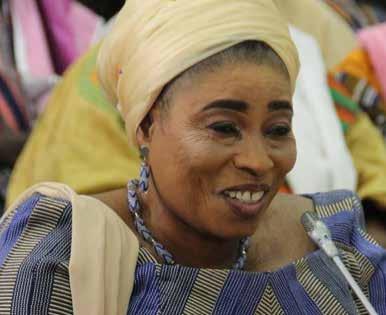
Addressing members of the Appointments Committee when she appeared for her vetting on Thursday at Parliament House, she said “The Ministry in collaboration the Vice President o ce we are doing digitisation, we are enrolling all schools in a digitize platforms and all caterers and bene ciaries, so this alone is going to reduce the hurdles and also all women that have challenges we have met them
and look to address their challenges
The Ghana School Feeding Programme (GSFP), launched in 2005, serves as the basis for Ghana's social protection strategy, which encourages more children to attend school and have daily access to a meal.
The immediate objectives of the Programme are to contribute to: increase school enrolment, attendance and retention, reduce short-term hunger and malnutrition amongst kindergarten and primary school children,boost domestic food production, with the long-term objectives of the
programme to contribute to: poverty reduction,improve food security.
She also told the Committee that government is taking steps to increase the amount allocated for the programme.
“Things have changed and government has taken cognizance of that and that is why he is increasing the amount.”
She touched on the Kayayei menace in the urban centres, which she said has been around for over two decades. According to her, she will engage stakeholders on how to make it digni ed or put them at a home “we have to sit down and look at the situa-
tion and look at fashioning solutions to it. The Ministry has taken some steps in the past, but I may do research on why they do and come back, so do we dignify it or should there be a policy that children should not be part of it.”
Plans to integrate ‘Kayayei girls’ in 1D1F -Dep Minister designate
The Deputy Gender, Children and Social Protection Minister, Francisca Oteng Mensah, said she will assist her sector minister to perform her mandate.

Further on the Kayayei issue, she indicated that the long-term plan is to collaborate with the Trade Ministry regarding the One District One Factory to see how best we can integrate these girls.
“ I think when it comes to the long term plan, will be to have a lot of collaborations with the ministries especially Trade so they have a lot of factories in these regions to see how these girls can be integrated to stop this migration that is going on, other thing is those within the Southern part, I will assist my minister to do a research and get to understand their problem – inspite of their training they go and come back, so we need to understand them and get to support them with government interventions.”
Institute becomes the premium learning partner to churn out trusted professionals for the banking industry.
Chartered Institute of Bankers, Ghana has said plans are underway to redesign the Institute’s academic curriculum to create more opportunities of quali ed bankers, develop future- t competencies and skills that employers need and to put ethics and professionalism are the core of banking profession.
This forms part of the institute’s mandate to promote the study of banking education and regulate the practice of banking profession in Ghana.
Speaking at the 2022 Annual Governor and Bankers Dinner, the President of the Institute, Benjamin Amenumey said this will ensure the

“Redesigning of the CIB Curriculum to create more opportunities for skillsets development as the premium learning partner to churn out trusted professionals for the banking industry. To this end, we will continue to put a premium on setting up more Banking Academies in collaboration with other banks, o er the Associate Chartered Banker programme and other banking certication programmes,” he said. He added that another key focus will be the implementation of technology-based learning and delivery. “The implementation of ERP (learning management system, data and enterprise resources management system) is another key focus area for us. We’ll seek to mobilize resources for the acquisition of the necessary capabilities and technologies to enable us to achieve the objectives of e ective learning and delivery,” he said.
He promised that the institute will
continue to uphold and enforce its code of ethics and professionalism. “As a new Council, we pledge to hold ourselves to the highest standards of professionalism and integrity and In line with our mandate, the Institute we will continue to develop future- t and ethical professionals. We will continue to set standards and ensure the observance of ethical standards and professional conduct among members. We will enforce the Ghana Banking Code of Ethics and Business Conduct which was launched in 2021 in collaboration with the Bank of Ghana and the Ghana Association of Banks,” he said.
The Chief Executive O cer of Chartered Institute of Bankers, Ghana, Robert Dzato, speaking at the 2022 Governor’s Day event (the Institute’s Annual Bankers Dinner), underscored the importance of the event.“The Governor’s day is an extremely important event in the calendar of Chartered Institute of Bankers, Ghana. It o ers us all industry players, the opportunity to interact with the Governor. It is an opportunity to listen to the Governor’s
re ections in 2022 and expectations on monetary policy for the coming years,” he said.
The Governor of the Bank of Ghana, Dr. Ernest Addison, gave his own advice to the assembled executives of banks, urging them to keep professionalism as a guiding principle. “The ultimate goal of our market conduct supervision is to help promote and sustain public trust and con dence in the nancial sector and to deepen nancial inclusion, we therefore encourage all of you to pay more attention particularly in area of customer service, ethical behaviours and general professionalism,” he said. “One cannont talk about development in the banking sector without talking about Ghana’s study progress towards nancial digitization. Indeed, digital services have ushered in an era of access to a variety of nancial products and services and thereby enhancing nancial inclusion and all of these, the banks roles cannot be overemphasized and to enforce these, the bank connects processes towards the issuance of the central banks digital currency which is the E-cedi in 2021,” he added.
The 2022 Annual Governor’s Day Dinner is the last event held by the institute to climax the year’s bankers’ week celebration held under the theme ‘Future of Banking in Ghana: Ethics, Professionalism, and ESG Imperatives’.
The celebration began with a month-long celebration of activities ranging from health walk, the 26th banking conference, induction orientation, and the 13th induction and graduation
It was a night of music and dance that included interactive elements, surprise performances, and plenty of opportunities to re ect on the participants' long years of work and show appreciation for their e orts and contributions to the banking community.
Six individuals including: Managing Director of National Investment Bank, Mr. Samuel Sarpong, Co-founding for Crescendo Consult Ltd, Mrs. Doris Ahiati; Chartered Banker and professional teacher, Dr. Mrs. Beatrice Odonkor; Head of Business Process Optimization at GCB Bank PLC., Dr Stephen Hammond; Chartered Banker and Asso-
ciate Member of the Chartered Institute of Bankers (CIB), Ghana, Dr. Mrs. Shirley-Ann Awuletey-Williams; Chief Executive O cer of Din-Nani Educational Support Foundation, Mr. Osman Abudulai were conferred a 2022 Fellowship of the Chartered Institute of Bankers (FCIB) honors for

ies from the 16 regions of the nation's banks, including their CEOs and managing directors, were presented. Other highlights for the night includes a presentation of an honorary citation to Right Rev. Patricia Sappor, FCIB, the Institute’s immediate past president, in recognition of her service as the
Many have dismissed last month’s COP27 climate conference as a failure, owing to the lack of progress on pledges made at the COP26 summit last year, and to the absence of clear commitments to phase out fossil fuels. More broadly, the COP process itself has been criticized as inadequate and ultimately unworkable, given its reliance on unanimity among all the parties.
But COP27 did produce one notable breakthrough: the world’s advanced economies, including the United States and the European Union, nally accepted some responsibility for the “loss and damage” caused by climate change. In the bureaucratic language of the nal communiqué, they agreed “to establish new funding arrangements for assisting developing countries that are particularly vulnerable to the adverse e ects of climate change in responding to loss and damage.” A special committee comprising 24 countries has been established to determine how the new fund will be nanced, managed, and distributed. Their conclusions are due at the COP28 summit in the United Arab Emirates late next year.

Yet, given that the Republicans will soon have control of the House of Representatives, it is hard to believe that the US will be putting much cash on the table. There is also uncertainty about whether China will be a major contributor. Although it is now a leading source of emissions, the United Nations still considers it a “developing” country. Finally, while the EU has accepted, in principle, that the countries most responsible for climate change should help bear its
costs, it is heading into a recession, which will most likely limit Europeans’ contribution.
China’s involvement is especially important. Not only does it generate almost one-third of global emissions, but the EU has made Chinese contributions a condition for its own participation. Hence, former British Prime Minister Gordon Brown warns that we could end up with a “fund without funders.”
But as real as that danger is, it should not diminish the importance of what governments agreed to at COP27. The developed world’s acceptance of responsibility for the impact of climate change establishes grounds for reparations, and indicates a degree of liability that will now be tested in courts around the world. “Climate justice” will evolve from a powerful slogan into a live legal issue. If climate change is the result of emissions – past and present – and if it is driving the increased incidence and severity of extreme weather, that means this year’s ooding in Pakistan and
creeping deserti cation in North Africa can be attributed to those who caused the emissions.
But who, exactly, is liable? The developed world’s governments have accepted that they are partly accountable. But responsibility, and therefore liability, might also be attributed to the companies that have produced, sold, and pro ted from the sales of the products that generated the emissions. Energy companies can try to argue that until the 1980s and 1990s, there was no scienti c consensus on the adverse climatic e ects of burning hydrocarbons. But from the 1990s onwards, that defense cannot stand.
The age of potential liability thus began around 30 years ago, when the Intergovernmental Panel on Climate Change and others started creating a body of credible scienti c research. And now, the age of real climate liability is upon us. For the companies involved – particularly those subject to the laws and political decisions of the advanced econo-
mies – such liability is an existential threat. It is analogous to the Master Settlement Agreement that resolved the con ict between the tobacco industry and 46 US state attorneys general over responsibility for the medical costs associated with smok-
But whereas that settlement required the companies to pay a total of $206 billion over 25 years, climate change and its associated costs are much bigger. The risks are global, and they are still growing, because emissions continue to rise. In fact, the worst is yet to come, and the potential costs are almost beyond
There will be a ferocious legal battle, to be sure. But simply by accepting responsibility for the global costs of climate change, in principle, the parties to the UN Framework Convention on Climate Change have let the genie out of the bottle. Fossil-fuel companies and their investors will not be able to claim that they weren’t warned.
True, COP27 left many participants and observers disappointed. Climate scientists, activists, and others are understandably dismayed that the urgency of climate change is being ignored, and that more immediate issues such as the cost-of-living crisis and Russia’s war in Ukraine are crowding out the attention of policymakers and the public. But the reality is that COP27 will likely be remembered as a watershed moment. Now that the developed world has nally accepted a degree of nancial responsibility for the loss and damage caused by climate change, the broader climate debate will henceforth turn on the question of liability. And that, in turn, could fundamentally change the main protagonists’ incentives.
Drew, a former cattle-driver who fed salt to his herds so that they would drink more water and take on more weight, soon double-crossed Vanderbilt, joining with Gould and his partner, James Fisk, Jr. During the Erie Wars, Drew, Gould, and Fisk “watered” Erie stock by issuing stock certicates in excess of the plausible value of the railroad’s existing assets. A New York judge in Vanderbilt’s pocket ruled against them. Drew, Gould, and Fisk ed New York with suitcases full of cash and Erie stock and bonds. I imagine the trio laughing and waving goodbye to Manhattan as they decamped to Jersey City, New Jersey – much like Bankman-Fried and his coterie of chums, who became millionaires and billionaires while working beyond the reach of regulators from a Bahamas resort.
er, not about taking others down in a zero-sum game. The Chinese nation has the proud tradition of standing up for itself. Suppression and containment will only strengthen the will and boost the morale of the Chinese people. Starting a trade war or a technology war, building walls and barriers, and pushing for decoupling and severing supply chains run counter to the principles of market economy and undermine international trade rules. Such attempts serve no one’s interests. We oppose politicizing and weaponizing economic and trade ties as well as exchanges in science and technology. Under the current circumstances, China and the United States share more, not less, common interests. It is in our mutual and fundamental interest to prevent con ict and confrontation and achieve peaceful coexistence. The two economies are deeply integrated, and both face new tasks in development. It is in our mutual interest to bene t from each other’s development. It is also in our mutual interest to promote post-COVID global recovery, tackle climate change and resolve regional issues through China-U.S. coordination and cooperation. The two sides need to respect each other, pursue mutual bene t, focus on the larger picture, and nurture a sound atmosphere and stable relations for cooperation.
corporate busts if con dence – and hence money – drained out of the nancial system. In the railroad age, there were two particularly severe nancial panics, in 1873 and 1893, followed by crippling economic depressions.
The US monetary and nancial system looked very di erent during the Erie Wars than it does today. The US was struggling to return to the gold standard, and the Federal Reserve did not exist. Still, during these years, given the recent centralization of US capital markets in New York City during the Civil War, Wall Street was over owing with credit, which made possible the egregious manipulations and schemes of Gould, Drew, and their ilk.
In addition to nancial manipulation, corporate access to easy credit fueled booming investment in the edgling US railroad industry. But much of it was unproductive. Corporate o cers like Gould grabbed the cash, bought up land, and built railroads across Native Americans’ sovereign territories before competitors could arrive. When workers struck for higher wages and eight-hour days, they crushed them.
The specter of corporate monopoly loomed. But so did the menace of
President Biden noted that he has known President Xi for many years and maintained regular
THE DIGITAL LAND GRAB
The parallels to today seem clear. Taking advantage of the low interest rates of the 1990s and 2000s, and then the ultra-low rates that prevailed for more than a decade after the 2008 global nancial crisis, Big Tech grabbed cheap money in order to gobble up rival companies, engineering talent, and personal data, sti ing competition whenever possible. And now, with interest rates rising fast, there is less credit bidding up stocks and cryptocurrencies, and it turns out that for many companies that had been gorging on debt, o ering a service to consumers at below cost may not be a viable long-term business strategy.
Abundant credit, it seems, inevitably taints animal spirits with greed, leading to excess and corporate malfeasance. It would be far better to tighten nancial conditions, as central banks are now nally doing, and subject companies to the whip of scarce capital and market competition, right?
communication, but nothing could substitute for the kind of face-to-face meeting today. President Biden congratulated President Xi on his re-election as General Secretary of the CPC Central Committee. As two major countries, the United States and China have a responsibility to keep a constructive relationship. The U.S. side is committed to keeping the channels of communication open between the two presidents and at all levels of government, so as to allow candid conversations on issues where the two sides disagree, and to strengthen necessary cooperation and play a key role in addressing climate change, food security and other important global challenges. This is vitally important to the two countries and peoples, and also very important to the whole world. President Biden rea rmed that a stable and prosperous China is good for the United States and the world. The United States respects China’s system, and does not seek to change it. The United States does not seek a new Cold War, does not seek to revitalize alliances against China, does not support “Taiwan independence”, does not support “two Chinas” or “one China, one Taiwan”, and has no intention to have a con ict with China. The U.S. side has no intention to seek “de-coupling” from China, to halt China’s economic development, or to contain China.
merits of “e ective altruism,” but that something has gone awry at the nexus of political and economic power.

The Erie Wars are well known partly because they were the subject of the book Chapters of Erie (1871), co-authored by Henry Adams and Charles Francis Adams, Jr., grandsons of US president John Quincy Adams. The Adams brothers, too, warned their readers not to focus on private greed but rather on politics. Reading their description of Vanderbilt, I cannot help but think of Musk ensconced at Twitter:
“[He] has combined the natural power of the individual with the factitious power of the corporation.
and China have a shared responsibility to show the world that they can manage their di erences, and avoid and prevent misunderstandings and misperceptions or erce competition from veering into confrontation or con ict. The U.S. side shares the view that it is necessary to work out the principles guiding U.S.-China relations. The two teams may continue discussions on the basis of the common understandings already in place, and strive for early agreement. The U.S. government is committed to the one-China policy. It does not seek to use the Taiwan question as a tool to contain China, and hopes to see peace and stability across the Taiwan Strait.
The famous “L’état, c’est moi” of Louis XIV represents Vanderbilt’s position in regards to his railroads. Unconsciously he has introduced Caesarism into corporate life…. Vanderbilt is but the precursor of a class of men who will wield within the state a power created by the State, but too great for its control.”
Corporations – the Erie Railroad and Twitter, the New York Central Railroad and Meta – are in the rst instance legal creatures of the state, and Vanderbilt was indeed a precursor to the “class of men” who wield so much power today.
able book The Progressive Assault on Laissez Faire: Robert Hale and the First Law and Economics Movement, published in 1998, when her son was six.
encourage the expansion of such exchange in all sectors.
Hale, a Columbia law professor and economist, tirelessly argued that, because the railroads and corporations like electric utilities provide essential public services, they should earn a “fair” rate of return on investment, given their production costs, but nothing more – and certainly not the ridiculous nancial valuations in credit-bloated capital markets.
It is not clear that cryptocurrency o ers any essential public service, although I agree with the judgment of Bocconi University’s Massimo Amato and Luca Fantacci that, in challenging the current global monetary system, crypto “poses the right question, but gives the wrong answer.” The public utility case is easier to make for social media companies.
Not necessarily. What matters is not so much the sheer volume of credit as where it goes and what it funds relative to society’s preferences and needs. So long as legitimate preferences and needs exist, there is no such thing as overinvestment. There are only bad investments. Morally speaking, the right response is to recoil at reports of Bankman-Fried’s shenanigans, nancial and otherwise. But ethics –throwing out “bad apples” before they spoil the entire barrel – is not the central issue. The problem is not excess and greed, or even the
President Biden said that how the U.S-China relationship develops is of crucial importance to the future of the world. The United States
THE RETURN OF THE REPRESSED In a sense, FTX’s implosion is ironic, because Bankman-Fried’s mother, the Stanford Law professor and philosopher Barbara H. Fried, wrote one of the nest scholarly studies of a very di erent conception of corporate power: the public utility ideal. News reports have focused on a supposedly revealing essay by Fried in which she wrote that a desire to locate “personal blame” had “ruined criminal justice and economic policy.” But she was right. Followers of the FTX saga would do better by turning to her indispens-
The two presidents agreed that their respective diplomatic teams should maintain strategic communication and conduct regular consultations; their nancial teams will continue dialogue and coordination on macroeconomic policies, economic ties and trade; and the two countries will jointly work for the success of the 27th Conference of the Parties to the United Nations Framework Convention on Climate Change. The two sides reached common understandings on conducting dialogue and cooperation in public health, agriculture and food security. They agreed to make good use of the China-U.S. joint working group to promote the resolution of more issues. They also agreed that people-to-people exchange is very important, and agreed to
The two presidents also exchanged views on the Ukraine crisis and other issues. President Xi pointed out that China is highly concerned about the current situation in Ukraine. He noted the four points about what must be done he had proposed soon after the outbreak of the crisis and the four things the international community must do together, he had suggested recently. Facing a global, composite crisis like the one in Ukraine, it is important to give serious thought to the following: rst, con icts and wars produce no winner; second, there is no simple solution to a complex issue; and third, confrontation between major countries must be avoided. China has all along stood on the side of peace and will continue to encourage peace talks. We support and look forward to a resumption of peace talks between Russia and Ukraine. At the same time, we hope that the United States, NATO and the EU will conduct comprehensive dialogues with Russia.
Regulatory principles like “public utility” deserve rediscovery. Others do not. Among them, I would count the over appreciation of sti ing bureaucracy during much of the twentieth century, which sapped the dynamism of enterprise. The problem is that when dynamism came roaring back in the neoliberal 1990s, greater inequality amid newfound tech riches, as well as a lot of corporate fraud and malfeasance, came back with it.
Much of what Big Tech values is praiseworthy, from fun (a good thing) to wondrous creativity. But the meltdown of FTX, and the turmoil engul ng Twitter and Meta, have once again exposed the costs of blindly worshipping enterprise and wealth. The state cannot a ord to leave matters of vital public importance, including citizens’ savings and the principal means of public communication, to the whims of paper billionaires’ puerile fantasies.
Both presidents viewed the meeting as in-depth, candid and constructive. They instructed their teams to promptly follow up and implement the important common understandings reached between them, and take concrete actions to put China-U.S. relations back on the track of steady development. The two presidents agreed to maintain regular contact.

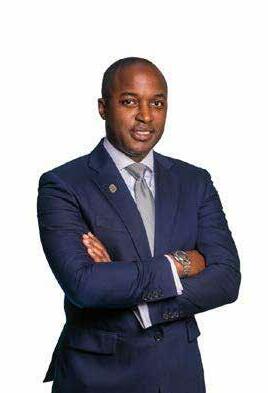

China's technology development accelerated after the Central Economic Work Conference in 2020, which made sci-tech capabili ties a top priority.
Though the COVID-19 pandemic posted a tough challenge and the U.S. kept expanding its trade black list with Chinese entries, Beijing still reached its goals in various sci-tech elds like microchips, nuclear power, manufacturing and space. Here are some achievements we have been actively reported here at CGTN Digital.
Chinese chips getting recognized The chip industry is one of the key issues in the China-U.S. trade relation. The U.S. is trying its best to strangle China's domestic chip industry, while China is building a complete supply chain for chip-making.
On processing chips like computer CPUs, the self-developed LoongArch is slowly gaining ground. Key pieces of software like GCC and Linux 6.0 added support for this
new type of chip architecture in 2022. With this support, other software can be ported to Loon gArch without much hassle.
For memory chips, the ChangXin Memory Technologies is selling some of the best consumer PC RAM sticks, while Yangtze Memory Tech nologies surprised the industry with mass-produced 232-layer NAND chip, which is on par with the world's best technology.
C919 jetliner takes o
The C919 is a civil jetliner made by the Commercial Aircraft Corpora tion of China (COMAC) that rivals the Airbus A320 and Boeing 737 MAX.
The rst C919 was delivered to China Eastern Airlines early in December, showcasing China's manufacturing and testing abilities.

More C919s are expected to y for airlines as COMAC received orders for hundreds of planes during Airshow China.
China Space Station is taking shape Sky is not the limit for China's
sci-tech development, as the country's space program is busy nishing the assembly of the China Space Station, which is expected to be
The station is now hosts the three-person Shenzhou-15 crew, the fourth trio to live in it, launched in
The building of the station is a large-scale implementation of China's space technology. In return, the scienti c experiments carried out on the station will help boost
The taikonauts on the China Space Station also took space lessons to students in China and other coun-
China has also reached new heights in clean energy, building more hydropower, nuclear and photovoltaic plants in 2022. Built on southwest China's Jinsha River, the Baihetan Hydropower Station is busy getting all 16 units ready for commercial operation.
Once fully operational, the station will become the world's second-largest station of its kind after the Three Gorges Dam and will generate electricity su cient for 75 million people and reduce carbon dioxide emissions by 51.6 million tonnes yearly.
China's self-developed third-generation nuclear power unit, the Hualong-1, has entered the mass production phase in August. Its designer says the unit's double-layer shell can withstand a magnitude-9.0 earthquake and even an air crash.
Exports of China's photovoltaic products surged 113.1 percent year-on-year in the rst half of 2022, according to the Ministry of Industry and Information Technology. The sunlight-to-electricity technology is also being combined with dams to build the world's rst hydro-solar power station in Sichuan Province. These clean energy projects will help China reach its carbon-neutral goal in 2060.

Managing Director of CalBank, Philip Owiredu, has inaugurated an ultramodern computer laboratory at the Asokore SDA College Demonstration Basic School, at a brief ceremony at Asokore, in the Eastern Region.
Philip also stated that CalBank, is a socially responsible bank with a special focus on supporting Health and Education in our communities.
The Bank, in addition, is a signatory to the Sustainable Development Goals, thus, strive and work to achieve quality education in the communities we work in.
The ICT Lab is in line with the Bank’s strategy to expand its CSI footprints while promoting STEM education in less deprived communities.
The project was undertaken by the Bank together with TECHAiDE, a technology social enterprise, which uses ICT to improve education and
providing appropriate technologies and developing human capacities that unleash the potential of individuals, communities, and institutions.
The facility, which is equipped with 40 computers, a Projector and Edulab Premium, will bene t over 1500 students from the host school and other neighboring schools.
Each of the computers installed at the Lab has pieces of educational software for Primary and Junior High Schools to help with the teaching of Science, Technology, Engineering and Mathematics (STEM).
Eight teachers will also be trained in ICT, Mathematics and Science to man the facility.
“My dear students of this noble school, as the world becomes very competitive and there is the need for basic knowledge in the study of STEM, it is my expectation that this facility will inspire you to achieve greater heights.
Accra. The team donated assorted food items and some cash for the upkeep of children in the home.
Head of Internal Audit at Stanbic Bank Ghana, Samuel Agyei Antwi, said that the donation forms part of the Bank’s essence of positively impacting the lives of the less privileged.
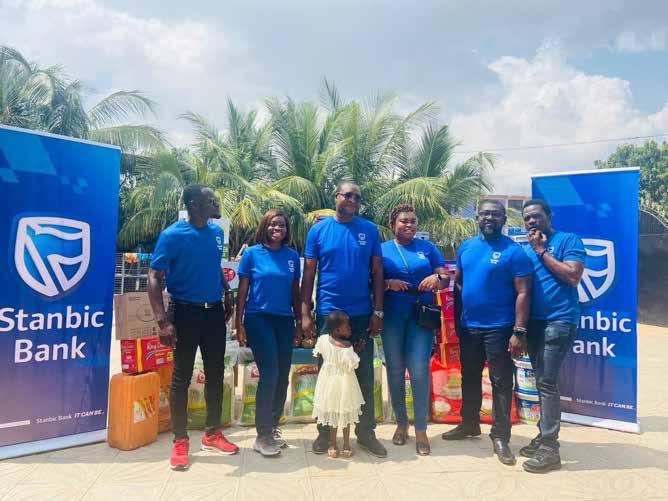
“We believe in making dreams
season of giving, we believe that this is the perfect time to visit and show our support and bring joy to these little ones as Christmas is fast approaching”
“We are impressed by the great work of the leaders of this home. We are very moved by your dedication, and we will continue to support your e orts. We are certain
He said, “Stanbic Bank is very caring
trustworthy when it comes to their services. I am glad that the good service of the bank goes beyond the banking hall. Running an
institution such as this comes with various challenges, and we are always thankful to receive a helping hand. Indeed, we are very grateful for the items you have donated to us today. Thank you to the entire Internal Audit team at Stanbic Bank. We are truly grateful.”
Stanbic Bank Ghana top priority is to drive national growth. And as part of its commitment to making the dreams of Ghanaians possible, it has been supporting the society in various ways over the years.
student from Asokore SDA will stand tall and say, had it not been for this day, he or she may not have been where they are today”, Philip advised the students.
He also seized the opportunity to appreciate the Nananom, the good people of Asokore, TECHAide and the CalBank team, for their communal support in getting the project completed.Mr. Paul Anaba, Founder, Nyamedua Children’s Home, who received the items on behalf of the home expressed his appreciation to the team for the kind gesture. and
The Asantehene, Otumfuo Osei Tutu II, and the Board Chairman of GCB Bank, Mr. Jude Arthur performed the ceremonial Tee-O for the GCB Bank Tournament of Champions at the Royal Golf Club in Kumasi on Saturday.

The prestigious Tournament of Champions is reserved for only the winners of all competitions that took place at the club in the year. The list also included quali ers from the top 5 ranked male golfers in Ghana by the World Amateur Ranking System.
The Asantehene praised GCB Bank for its continued support for golf in the country and encouraged the Bank to continue its good works.
The Managing Director of GCB Bank PLC, Ko Adomakoh said, “Golf is a sport, and keeps people healthy.
“A bank like GCB looks after the nation and to develop our country properly, we need healthy people.
Golf is one of the sports we at GCB have decided to support.
“It is a tournament for champions, and you know GCB we are champions, we associate ourselves with excellence. It is not only a tournament for champions, it is a tourna-
Ghana is one of the most in uential cultures in West Africa, but to understand the future of its fashion industry, it is important to know its past and the nuances of its present.

Every nation has their preferred fabrics, shapes and silhouettes. Historically, for some groups in Ghana, the gonja and kente cloths are the textiles that hold signicance. Originally worn by royalty, kente cloth is now a marker of tradition and is used for special occasions like weddings, as well as being a source of inspiration for contemporary designers like Sheelah Garbrah and the late Virgil Abloh.
Inextricably linked to cloth is the integral role played by tailors and designers in Ghana’s fashion industry. Put simply, Ghana’s artisans and creatives are some of the most highly skilled and resourceful in the world. This is because, many learn and develop a wide range of skills, including design, pattern making, beading, weaving, tailoring and much more. Indeed, there is little distinction made between tailors and designers, so most people learn and develop skills across both disciplines.
Understanding the challenges faced by the Ghanaian fashion industry
Tailors and designers represent the foundations upon which the Ghanaian fashion industry can grow and prosper. However, despite their talents and skills, they face sti competition, not only from their peers, but from second-hand clothes imported from other countries.
According to the Tony Blair Institute For Global Change, Ghana received approximately $180 million in used clothing imports in 2020. Accra’s Kantamanto market is the biggest second-hand market in West Africa and approximately 100 containers, holding around 15 million items, are unpacked every week.
The volume and price of second-hand clothing can negatively impact the demand for local design talent. During di cult times, people are more likely to buy cheaper clothing from second-hand merchants than pay for higher-quality garments from designers and tailors.
Along with the economic impact, the second-hand clothing industry also has a negative impact on the environment. With such a large scale of second-hand imports, some clothing eventually end up as waste. According to Plastic Soup, unusable clothing lands in sewers
which washes up on beaches and some are incinerated.
Against this challenging backdrop, for the next generation of Ghanaian design and fashion talent to prosper, it’s imperative that they’re equipped with the skills needed to ourish.
Thankfully, there are many resources at home and abroad for Ghanaian talents to learn and cultivate their craft. And, in our opinion, it’s vital that established individuals and organisations across the fashion and textiles industries play their part.
At Vlisco, we’ve sought to do this through our Vlisco Fashion Fund, supporting emerging designers and tailors in the process of establishing their careers in the fashion industry. The fashion fund helps participants by sharing knowledge, expertise, access to an expanded network and more.
The importance of such mentorship schemes cannot be overstated. Some fashion designers are creative but may struggle with the practicalities of running a business, such as marketing, accounting, website development and more. Others may want more guidance on fashion techniques such as corsetry, embroidery and alternative skills.
ment the Otumfuo himself and Asanteman support.
“We will continue to stand by our clients through these challenging times.”
Head of Operations at the Royal Golf Club, Professor Bernard K. Baiden commended GCB Bank for supporting the sport and for being the sole sponsor of the event for 5 consecutive years.
At the end of the event, Bismark Dapaah, was crowned as the overall male golfer of the year, while top golfer Constance Awuni picked the ladies’ version.
Daniel Ntim nished rst with a 70 net score in the 18-hole shotgun competition, beating Felicity Okyei Gyeabour (71) by just a stroke.
George Antwi emerged the 2nd runner-up with 72 net score.
In the support competition, Nana Kojo Armah, the Omanhene of Sefwi Bekwai Traditional Area emerged winner with a net score of 73, followed by Mr. Sam Aidoo, Executive Director for Wholesale & Retail Banking, GCB Bank who emerged runner up with net score of 75.
Regardless of which side people fall, mentorship can help bridge the gap between the creativity needed for fashion and the know-how needed to sustain a business.
With better understanding of their craft and commercial realities, designers and tailors can o er a better and wider range of services to attract more customers. - even from other parts of the world.
Deladem Mideko, founder of Maison Midekor and 2022 Vlisco Fashion fund winner, is doing just that and more. The Ghanaian designer plans to expand her brand in French countries and train the less privileged in order to provide them with a means of employment.
The future of the Ghanaian fashion industry is bright. Ghanaian designers and tailors are exceptionally talented in making and designing beautiful garments. However, ensuring these collective talents are harnessed to truly drive the growth of the Ghanaian fashion industry, and stimulate domestic and international demand, will take a concerted e ort.
Crucially, we need to see industry playing a greater role. Let’s face it, there’s more than enough expertise to go around, we’re calling on our partners across the fashion, design and nancial sector to think about the roles they can play. Whether it’s knowledge sharing and mentorship on topics as diverse as entrepreneurship and networking, or access to resources, such supports, make the di erence in helping the next generation grow their businesses and reach new audiences.
China believes Africa is the place for international cooperation instead of major-power competition
Africa should be a place for international cooperation, not for major-power competition for geopolitical gains,” Chinese ambassador to the U.S. Qin Gang talked about U.S. and China’s role in Africa with Semafor’s Editor-at-large Steve Clemons at the Semafor Africa Summit.
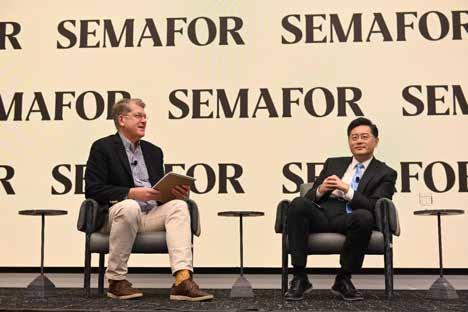
Qin pushed back against the false claims that China is creating a “debt trap” in Africa, pointing out that China’s nancial assistance to Africa aims to help African countries build infrastructures for economic and social development. “It is transparent, it is sincere,” Qin said.
China has been welcomed by African countries for its stance on non-interference in internal a airs and win-win cooperation. In the recent report entitled “The Biden Administration and Africa in a Changing Global Order: Towards the 2nd US-Africa Summit,” experts from the Institute for Global Dialogue of South Africa provided an African perspective on U.S.-Africa relations, noting “the US engagement largely seeks
to counter China and Russia” instead of addressing Africa’s development challenges.
Both China’s Foreign Ministry and Ambassador Qin Gang emphasized the importance of mutual respect, equality, and sincere cooperation in supporting Africa’s development. Africa is an independent continent regarding foreign policy.
China rmly opposes using Africa as a geopolitical tool, but China welcomes the international community to help African coun tries for the continent’s socioeco nomic development and the welfare of its people.
Qin Gang pointed out that the U.S. and China should extend coopera tion in Africa. As the major coun tries and permanent members of the Security Council of the United Nations, U.S. and China share common responsibilities for the future of the world. The two coun tries should demonstrate interna tional cooperation on peace, securi ty, and prosperity in Africa.
Chinese ambassador to the U.S. Qin Gang rebukes claims of “debt trap” in Africa
Chinese ambassador to the U.S. Qin Gang pushed back against “Chinese debt trap” claims, citing China is not a large creditor of African debts with transparent data. Qin
addressed the China-Africa relations Monday with Semafor’s Editor-at-large at the Semafor Africa Summit.
“African countries owe three times more debts to Western private lenders than they owe to China, and their interest rates are double,” Qin said. According to the World Bank and Debt Justice, most of Africa’s debts are owned by non-Chinese multinational institutions.
African countries owe only about
service payment among G20 members.
“Africa should be a place for international cooperation, not for major-power competition for geopolitical gains,” Qin said China’s relationship with Africa is sincere, and China is not interested in the views of other countries on China’s role in Africa.
Ambassador Qin Gang welcomed the international community, including the U.S., to help Africa in e orts for
buying African products to create jobs for her rapidly growing youth population.
Madam Catherine Afeku, responsible for Strategic Communications, National AfCFTA Coordination O ce, said, having KETEPA tea in Ghana indicated that the single African market was bearing fruits. She said Ghana would sooner than later send some chocolate, other cocoa products and coconut oil to Kenya, so “there are opportunities in Kenya for our entrepreneurs to explore.”
In an interview with the Ghana News Agency, the former Minister for Tourism, Arts and Culture, said Africa needed trade to stop the dependency on the western world.
“There is a plethora of value-added products in Ghana and our jobs is to let the Ghanaian entrepreneurs know what is possible under the Guide Trade and AfCFTA,” she said.

Holdings Ltd. (KTDA).
ed products with a brand name KETEPA, deepens the bilateral trade between the two countries and commitment to maximise the opportunities AfCFTA presents.
Ghana had earlier through its National Coordination O ce of AfCFTA shipped palm kernel oil and ceramics to Kenya and Cameroon under the Guided Trade Initiative (GTI).
The rst consignment of a 20-foot
The Company is the leading tea blending, packing and marketing entity in Kenya with over 100 products.
Kenya is the third largest producer of tea globally – behind China and India, and in 2021, exported 305, 000 metric tons worth US$ 1.2 billion.
Speaking at the unveiling of the rst consignment, Mr Eliphas Barine, Kenyan High Commissioner to
situation that needed to change as the continent was committed to creating wealth and prosperity for its people.
“…and the introduction of the KETEPA tea Ghana is a testimony of changing the narrative by leveraging the opportunities AfCFTA presents,” Mr Barine said.
He said Africa was under stress in her socioeconomic development and called for supporting and
“The GTI seeks to allow commercially meaningful trading, and test the operational, institutional, legal and trade policy environment under the AfCFTA.
“The products earmarked to trade under this initiative include ceramic tiles, batteries, tea, co ee, processed meat products, corn starch, sugar, pasta, glucose syrup, dried fruits, and sisal ber among others.”
Source: GNAbelieves Africa is the place for
instead of major-power

Ghana’s far-reaching digitisation programme and its implications for businesses operating across the economic sectors will be explored in a forthcoming report by the global research and advisory company Oxford Business Group (OBG).
The Report: Ghana 2023 will shine a spotlight on the wide-ranging tax reforms under way, which form a key part of broader e orts to boost revenue and bring about scal consolidation.
Focal points will include the newly introduced e-levy, nancial sector recovery levy, energy sector levy and Covid-19 recovery levy, alongside other key developments, such as the implementation of tax identication numbers.
orandum of understanding (MoU) with PwC Ghana as it begins work on The Report: Ghana 2023. Under the agreement, PwC Ghana will team up for a third time with OBG to produce the Tax chapter of the report and other content for the Group’s suite of research tools.
The MoU was signed by Ramona Tarta, OBG’s Country Director for Ghana, and Ayesha Bedwei Ibe, Tax Leader, PwC Ghana and PwC Global Tax and Legal Services People Leader.
country moving to introduce policies and reforms aimed at ensuring new growth is sustainable and more inclusive.
“Ghana
wisdom? For starters, commentators often confound income growth in the 1970s and 1980s with the decades that followed. Incomes were indeed stagnant during that earlier period. The annual rate of growth for real median household post-tax-and-transfer income was over three times faster from 1990 to 2019 than it was from 1979, the year CBO’s data begin, to 1990.
The Report: Ghana 2023 will mark the culmination of more than a year of eld research by a team of analysts from Oxford Business Group. It will be a vital guide to the many facets of the country, including its macroeconomics, infrastructure, banking and other sectoral developments. OBG’s publication will also contain contributions from leading representatives across the public and private sectors.
The BLS’s wage data go back further. They show that consumer prices grew faster than wages from 1973 until 1976 –owing largely to the 1973 oil crisis – and from 1979 to 1981. Real wages for typical workers continued to decline throughout the 1980s. By the end of 1990, they had fallen by 9% from their 1973 peak.
According to the conventional wisdom, income stagnation and inequality are large and growing threats to broad-based prosperity in the United States. Many economists, journalists, business leaders, and elected leaders (from both parties) believe that for a large share of households, real (in ation-adjusted) income has not increased for decades, and

The report will also map out Ghana’s growth prospects, providing in-depth analysis of the heightened activity evident across the extractive industries, which has been a major contributor to the
Relying on anecdotes and intuition to compute economic trends can work sometimes, but it can just as easily lead one astray. Fortunately, we can nd clarity in statistics released last month by the nonpartisan Congressional Budget O ce – the referee in US economic policy debates – which con rm that the conventional
Commenting after the signing, Ibe said that OBG’s forthcoming report would be a valuable research tool for investors eyeing Ghana’s potential, coming against a changing business landscape marked by ambitious scal and tax reforms.
“Ghana is keen to attract investment for key sectors of the economy identi ed as ripe for

taxes they paid. After factoring in social insurance bene ts (from Social Security and unemployment insurance, for example), government safety-net bene ts (such as food stamps), and federal taxes, the CBO nds that median household income increased by 55% from 1990 to 2019, which is signi cantly faster than wage growth and certainly not stagnate.
I’m thrilled that our analysists and, in turn, the international investment community will continue to benet from their expertise in analysing this important market.”
The Report: Ghana 2023 will be produced with the Association of Ghana Industries, PwC Ghana and other partners.
The Report: Ghana 2023 will be available online and in print. It will form part of a series of tailored studies that OBG is currently producing with its partners, alongside other highly relevant, go-to research tools, including ESG and Future Readiness reports, country-speci c Growth and Recovery Outlook articles and interviews.
Second, the surge of concern about inequality during the post-2008 Great Recession and the early years of the subsequent recovery was more about stagnating wages and incomes for typical workers and households than about the size of the gap between higher- and lower-income households.
The CBO’s data show that real median household income, after accounting for taxes and transfers, fell following the nancial crisis, and did not recover to its 2008 level until 2014. Wages tell a similar story.
Click here to subscribe to Oxford Business Group’s latest content: http://www.oxfordbusinessgroup.com/country-reports
There are many ways to calculate these trends, but the CBO’s data tell the most accurate story. As the period following the nancial crisis shows, it de nitely is not a tale of uninterrupted wage and income growth. But if the narrative choice is between “growth” and “stagnation,” the wage and income data point to the former.
This is not to suggest that wages and incomes have been growing fast enough, or that policymakers should be satis ed with where we are. Increasing participation in the labor force, boosting workers’ skills so they can command higher wages, and breaking down barriers to opportunity and advancement should all be at the top of Congress’s
But the fact that wages and incomes have been growing over the past several decades should give policymakers condence they will be building on a foundation of economic success, not failure.
is taking steps to restore macroeconomic stability and boost GDP in the recovery phase, which is key to instilling investor con dence and increasing in ows,” Tarta said. “PwC Ghana has long been instrumental in supporting a wide range of businesses looking to establish themselves and expand their presence in the country, combining in-depth knowledge of changes to the local tax and scal environment with the bene ts of a global professional resource base.


WEEKLY MARKET

FOR WEEK ENDING
DECEMBER 2 , 2022
DECEMBER 9, 2022
DECEMBER 2, 2022
DECEMBER 2 , 2022
DECEMBER 9, 2022


DECEMBER 2, 2022


DECEMBER 2 , 2022
DECEMBER 9, 2022








DECEMBER 2, 2022


DECEMBER 9, 2022





DECEMBER 2 , 2022
DECEMBER 2, 2022
Healthline Show dubbed “The Spin-O .”
The show is a documentary-style recap of the top 10 episodes from the Healthline series’ last three instalments, namely seasons 8–10. The most important aspect of the new season is that the Vodafone Healthline team will visit the people who have bene ted from Vodafone Ghana’s medical interventions.
In the rst episode of the new season, the parents of Diana, a young girl from the Volta Region, talked about how Vodafone Ghana helped their daughter get through surgery for a brain tumour.
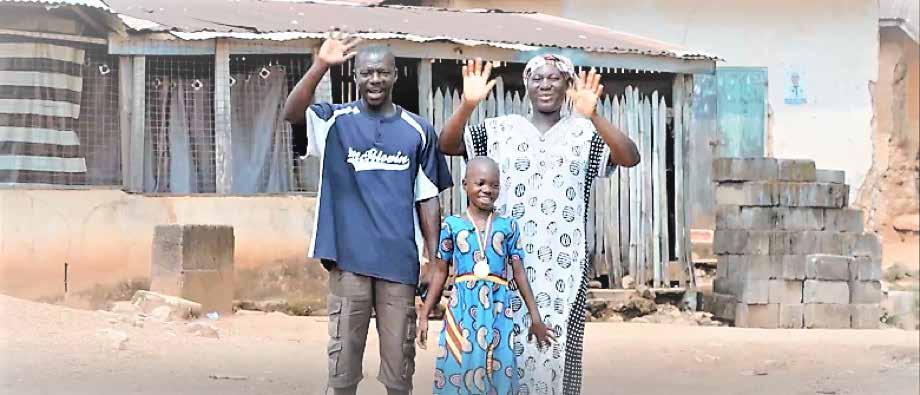
Diana’s family only learned of her condition after a friend hit her head with a stone. The subsequent swelling after the incident and the di culty in diagnosing the real problem at its initial stage made her family believe that her condition had a supernatural cause. Because
The Healthline team’s visit to the family months later revealed that Diana is hale and hearty and can now play with her friends.
In the rst episode of the “Spin-O ” season, panellists talked about the early signs of childhood cancer and the idea that masturbation causes strokes.
Dr Nihad Salifu, a paediatric oncologist, spoke about childhood cancers, their early warning signs, and the treatment process. In her submission, she said that doctors do not know all the causes of childhood cancers, but there are other things like genetic predisposition or viruses that can cause them.
She said that if a child’s eyes look di erent than usual or if there is swelling around the neck, legs, arms, or abdomen, it is important to see a doctor for a full check-up.
Dr Salifu noted that childhood cancers di er from cancers in
treatment for childhood cancers that may give them a better chance of surviving.
Aba Folson and Kwekuma Yalley, two doctors, talked about the interesting link between masturbation and stroke and concluded that masturbation does not cause strokes.
The doctors noted that, medically, the merits of masturbation outweighed its demerits. “However, when people engage in masturbation for so long, it becomes di cult to engage intimately with your partner, and it is unfair to you and your partner,” Dr Aba Folson claried.
The doctors said that people who cannot control their urge to masturbate to the point where it a ects their lives and relationships with others should get help.
In the next ten episodes of the new season, there will be a lot of free
of common myths, and heart-warming stories of patients whose lives have been made better by Vodafone’s help.
Vodafone Healthline has been on the air for more than a decade, and it is still seen as the most in uential, educational, and important health and wellness platform in the country.

Through the Vodafone Healthline show, Vodafone Ghana has provided free medical education and interventions to the Ghanaian public. The show keeps giving out useful information through interesting content on selected media outlets and social media.
The Vodafone Healthline Spin-O edition airs on UTV on Mondays from 9:30 p.m. to 10:00 p.m. and on DGN on Tuesdays from 6:00 p.m. to 6:30 p.m.